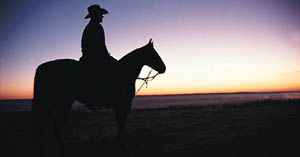|
|
|
| Subscriptions click here for 20% off! | E-Mail: info@rangemagazine.com |
|
|
||||||||||
 |
||||||||||
| Riding a horse, soaking up the sun and rain on the range, is a good way to live and a good way to die. By Michael Martin Murphey |
||||||||||
| His mother’s voice on the telephone was firm and steady, without
a trace of remorse, maudlin self-pity, or patronizing grief. I
listened as she spoke plainly of her son’s last wish. Her 30-year-old
son was a lover of the cowboy lifestyle, a latter-day Wild Westerner
who proudly hailed from Oklahoma. He loved grazing animals, rodeos,
customized pickup trucks, good horses, and cowboy songs. Yes,
he loved all these things, and he had an inoperable, incurable,
rapidly spreading brain tumor. His last wish was to get back in
the saddle one last time, to ride in the mountains. He wanted
to hear the creak of the leather, feel the easy rhythm of the
hoof beats, get a whiff of the sap of the spruce on the wind.
It would be Clint’s Last Ride. |
||||||||||
| I first met Clint, his mother, and the earnest souls from the
hospice in Taos, in Red River, N.M. They came to hear my cowboy
music show at the 150-seat Mine Shaft Theater on Main Street,
in my tiny little hometown. After the show, they brought Clint,
who was leaning on a cane, to the backstage for a visit. I am a singing cowboy, a horse and cattle rancher, an outfitter, a confessed addict for all things western–a “romantic.” I live just up the road from Red River, in a log cabin at the top of Bobcat Pass. It’s easy to pack up my guitar, drop down from the cabin’s 10,400-foot altitude to 9,000 feet in my four-wheel drive pickup, to play a few cowboy songs for the good folks who visit our town in search of a “Western Experience.” Red River, you see, is sort of like a western version of “Mayberry,” the wide spot in the road where Andy Griffith and Don Knotts played out their endearing small-town antics in one of the most enduring television comedies in history. Of course, that was a Southern town, but you get the picture. Just put cowboy hats and boots on the Mayberry folks, and you’ve got Red River. I sometimes call it, “Ski-Berry.” |
||||||||||
|
“Oh when I die, –19th Century Cowboy Folksong, Author Unknown |
||||||||||
|
Clint wanted to come to Red River to hear a few cowboy songs,
to breathe the mountain air, no matter how frail he might be.
As I stood there, making nervous conversation with a dying young
man, he smiled at me, handed me a card, and told me to read it.
The card was handmade, painstakingly drawn and designed by a man
who had to struggle to steady his hand. It was a well-drawn rendering
of Clint, riding off in the sunset toward a rock formation like
the Rainbow Bridge Arch in Utah. Clint had drawn himself twisted
around to face the reader of the card, nodding a cowboy’s farewell.
But he had also depicted himself as flicking a horsefly off the
horse’s rump. The message was clear. He was leaving, riding off
in the sunset–but he was in no hurry. It was as if the horsefly
was his pesky cancer; it was a part of the process, expected to
be there, but a pest to be whisked away, as often as possible.
Michael Martin Murphey is originator of the Westfest (a festival celebrating the American West culture), owner of Westfest/Valley Records of Santa Fe, founder of The Murphey Western Insitute for American West Cultural Studies, The Murphey Public Trail Fund, and The Murphey Library of the American West. He serves as an adjunct professor at Utah State University and The University of New Mexico-Taos. His websites are <www.MichaelMartinMurphey.com>, <www.Westfest.net>, and the web portal for the American West, <www.WorldOfTheWest.com>. |
||||||||||
